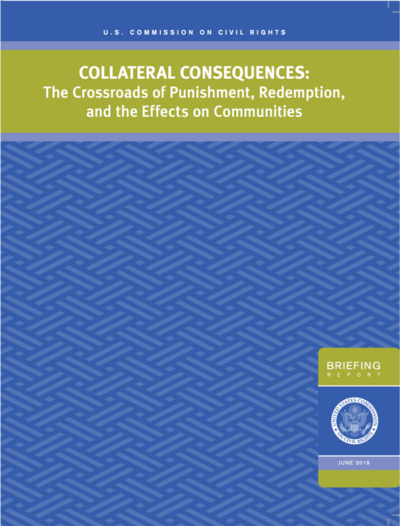Collateral Consequences: The Crossroads of Punishment, Redemption, and the Effects on Communities
Report
Clean Slate
Topics:
Background Checks
Collateral Consequences
Community Supervision: Probation and Parole
Criminal and Juvenile Records
Employment
Housing
Records Clearance, Expungement, and Sealing
Reentry population:
Adults
Date:
Source:
U.S. Commission on Civil Rights
Collateral Consequences: The Crossroads of Punishment, Redemption, and the Effects on Communities
As this report from the U.S. Commission on Civil Rights details, each year, federal and state prisons release more than 620,000 people to return to their communities. While these individuals have often completely exited criminal supervision -- usually through a prison sentence or probation -- the authors describe that individuals with criminal records still face potentially thousands of collateral consequences upon reentering society. These collateral consequences are sanctions, restrictions, or disqualifications that attach to a person because of the person’s criminal history and the impact of each consequence extends past people with felony convictions to affect families and communities.
This report provides an overview of the relevant data and arguments for and against the imposition of collateral consequences on people with criminal records. Chapter 1 summarizes the diverse range of collateral consequences, the demographics of the populations affected, and the numerous federal and state laws imposing collateral consequences in various localities. Chapter 2 summarizes the collateral consequences that can impede a person’s access to basic needs like housing, employment, and public benefits. Chapter 3 examines the collateral consequences that hinder an individual’s access to civic participation through voting and jury service and explores the racial origins and racial disparities of collateral consequences. Finally, the report offers the key findings and recommendations from the Commission.




